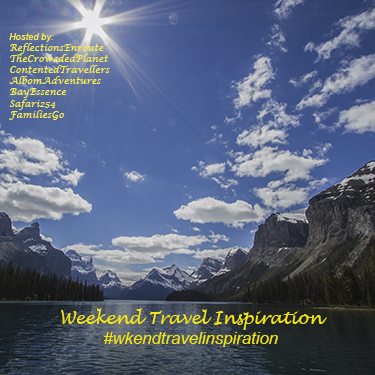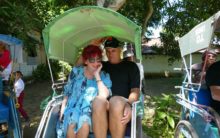The Anti Bucket List Diatribe
Contents [hide]
The perennially favorite term amongst many travelers is to make a bucket list. A list of all of the things that they want to accomplish before they die. It is time for a diatribe – the Anti Bucket List.
[clickToTweet tweet=”Bucket Lists are cliched, and historically inaccurate. #travel #NgTradar” quote=”Bucket Lists are cliched, and historically inaccurate.” theme=”style3″]
The history of the term Bucket List
Some claim this term started in the later Middle Ages. When a corpse was laid out, a bucket of holy water was placed at its feet. Visitors could then sprinkle the deceased with Holy Water. I am not sure whether the corpses kicked it. It is not out of the realms of possibility since corpses were taken to the families homes immediately to be prepared, and maybe there was some twitching still happening.
The Suicide
In 1785, Captain Francis Grose wrote a book called the Dictionary of the Vulgar Tongue, where he used the phrase “To kick the bucket, to die.” Tenuous at best, he was referring to the way that people stood with a noose around their neck, on a bucket, before kicking the bucket away to kill themselves. In this line of thinking, a bucket list once completed means that people will commit suicide.
The Squealing Pig Murder
Most etymologists agree that a bucket is a reference to a kind of yoke that held pigs by their heels so that they wouldn’t move when being slaughtered. Jonathon Green has also cited this in the book “Slang Down the Ages” that the wooden frame that was used to hang animals up by their feet for slaughter was called a bucket. Because the animals were not happy with this mode of death, they thrashed around and ‘kicked the bucket’.
In Norfolk, UK, the beam on which a pig was suspended, after s/he had been slaughtered, is called – even in the present day – a bucket. Since he is suspended by his heels, the phrase to kick the bucket came to signify death, and not the’ I am going to sleep’ death, but murder actually.
The Mob Bucket Listed
In the 1920s, the Chicago mob favored concrete shoes for people who didn’t appeal to their code of ethics. The concrete shoes were made by filling a bucket with cement, putting the victim in the bucket with his brogues on and then throwing them in the river to sink. The victims, of course, struggled and kicked the bucket to avoid their fate.
Therefore, a bucket list has connotations with suicide, slaughter and murder. People continue to write their bucket lists. Glowing and positive buckets lists of all of the glorious and magnificent things they will do.
Is it reasonable to assume, based on the above evidence, that bucket list makers are people who intend to take their lives, or be murdered just like a screaming pig?
A Bucket list? Really?
Making a bucket list is cliched, and passé
Where is the spontaneity? Where is serendipity?
Might not your values, needs, wants and desires change based on what you do along your life’s paths? If jumping out of an airplane was paramount to having a successful life when you wrote the list in the first place – what are you going to do if for some reason you can’t do this?
What are you going to do if you just don’t want to do these things anymore? Feel like a failure? Are you going to top yourself?
Time to re-assess this bucket list usage
There are many better ways to express some of the things that you might like to accomplish. A ‘wish list’. ‘I’d like to do this list.’
Bucket Lists are cliched, historically inaccurate, and jumping on the same bandwagon as everyone else.
If you are true to yourself, then once you have completed all tasks on your bucket list, you choose the pig route, the suicide route or the concrete shoes.
It’s Link Up Time
1. Link one of your inspirational travel photos or stories to this post by adding your info.
2. Copy and paste our badge and a link to this page.
3. Visit some of the other wonderful travel bloggers, read their posts, and leave a comment. It would be great if you could comment on 2-3 posts.
4. Tweet it and include this hashtag. #wkendtravelinspiration .
5. Follow all the hosts of Weekend Travel Inspiration who are working hard to spread the word on what wonderful work travel bloggers are doing.
[inlinkz_linkup id=509755 mode=1]










Thank-you for this!!!
Pleasure Katie
I agree with you! Bucket Lists have a morbid background tale and take the magic away from travelling. Just another manifestation of our high-achiever society. Maybe I’m exaggerating though, but NOT FOR ME! Thanks for the fun post!
It is such an interesting history of a cliched term.
A lot of great tidbits of info, thanks for sharing. We have never been Bucket List people, we’d rather have a “Do it” list
I agree; too many bad connotations with a bucket list
Well-said.
Thanks Larissa
I dislike any kind of ‘before I die’ list, book or whatever. It just sounds morbid. There are always places that I want to travel to, and some are higher on my ‘mental list’ than others, but that can change at the drop of a hat!
I am with you. I do not want to associate our wonderful travels with death
Since my list includes pretty much everywhere, plus returning to places I particularly liked, I don’t have a list. I plan trips based on what place seems to be in my thoughts most. Interesting to know the real history of the term!
We are spur of the moment travellers also, which makes it fun. i enjoyed finding out about the history also.
My list is more of a “To go to” list and whenever I check one thing off the list, 3 more things seem to get added! At this rate, I need to live to 100 or travel year round.
Ditto, us to.
What a fun post – I love trivia and, when it’s mixed with some history, it’s even more fascinating. Your point about a list changing is very true – as our travels have commenced over the years our “Wanna do List” has evolved and changed. The important thing is to make and grab opportunities as they present themselves and go with the flow…
Totally agree Anita. It is important to go with the flow. You just can’t plan for some things. Serendipity.
Hahaha…I do not want any of the other routes: suicide, pig, or mob so I will just stick to it as long as I can. Make a Wish Foundation makes a wish list also for those who are dying. So, to elude the negatives and death, I will stick to a cliche!
The Make a wish foundation is a brilliant idea to give people something special when they need it most. It is a wish and that is why I love the concept.
I do think it is impossible for me to complete my bucket list, so no worries. But wish list works for me, too.
Everything is possible Carole, and wish lists work well.
I get it! I usually cringe when I hear “bucket list” and have only used the term under duress. But I had no idea about all of these interesting historical facts. Now it’s time for me to get back to working on my very, very long “to-do” list.
But I had no idea about all of these interesting historical facts. Now it’s time for me to get back to working on my very, very long “to-do” list.
It is an interesting history and I also have a long long list of things I would like to experience
Well I never…now I know why I never liked the term bucket list! I suppose I should have realised it was all about death but I actually had never really thought about it…just avoided making one! It’s more exciting not knowing where you’ll end up!
It is a fascinating to know that the term has a basis in history and death. I think many people use it based on a movie that I actually haven’t seen.
Great post, Paula. My motto is ‘just do it’ – no need to put it on a list first.
And you are right about the experiences you have leading you in a different direction than you had thought…
Thanks Yasha. I think that serendipity yields so many exciting experiences rather than a prescriptive list.
Paula, This totally cracked me up. I love learning the history of our words…and I do have a list…just a “list”. Not a bucket list!
Thanks Corinne. It is a great history and a bit of a swipe at people who go write these bucket lists
And I always thought the term ‘bucket list’ came from a movie.
I don’t know the movie. It mustn’t have been playing on a long haul flight, which is about the only time and get to watch any.
What an interesting history! The term may be cliche but I think life is a combination of serendipity and goal-setting.
Thanks Irene, it is an interesting history and we agree that you need to set yourselves targets of what you would like to achieve.
Ack, I didn’t know the history behind the term. It all sounds rather gruesome. There are places that I long to see, but I don’t ever call it my bucket list. I do like that right now I feel that travel is limitless and that I can go anywhere that I desire if I put enough effort into it.
I also believe that if you put your mind and heart into it, you can do anything. Interesting history of the term though.
Well, this one sure made me think. I only picked up the term from the movie, “The Bucket List” but now that I know the potential history . . . . interesting. My “bucket list” has always been more of a things to do list, a wish list, an ever changing list as I generally tick things off as fast as I add them, so I haven’t really lost the spontaneity. Maybe it needs a new title, maybe I am just a cliche, who knows. What I do know, this is a great read.
Thanks Rhonda, I was wondering one day where the term came from and decided to look into the history.
I don’t really like bucket lists either. There is almost a competitive aspect to them. And, as you’ve pointed out, what you want to do changes with time. And sometimes really wonderful opportunities and experiences come your way in a place or item that you would never have considered putting on a bucket list.
I find it too definitive a term because as you say, serendipity happens when you least expect it.
I have a “List of Adventures”!
I like that. A list of adventures and experiences, which is effect are one and the same.
Such fascinating history about the bucket list. I had no idea! Interesting concept about the anti-bucket list. I like to plan some things and also be as spontaneous as possible. Perhaps I’m a middle of the road lister.
LOL, I think we can all be whatever we want to be.
There are a lot of things I’d rather not think about in this post. As far as I can tell, the term “bucket list” became especially popular after the film of the same name was released. I don’t usually choose to use it, but it doesn’t offend my ear/eyes when someone does.
I thought the history of the term was most interesting. Thanks for your thoughts on this.
Couldn’t agree more, Paula!
There are lots of places I want to visit, or things I’d like to do, but I prefer not to term them a bucket list, with all the connotations that surround it.
Thanks Paul – there are better terms
There are few places I really hope to visit: Galicia, Egypt, Machu Pichu, Australia, New Zealand, Tahiti, Panama City, China. But life takes you where it takes you. If I were a plan-ahead person I would decide I’m going to take one of these bigger trips in say, 2018 and start saving and planning, but i’d probably miss out on other fun, interesting travel opportunities while doing that. So, I suppose as you say, this is a wish list rather than a to-do list. And with travel, I find, wishes can come true.
I am all for spontaneity – while there are many things I would like to see and to do, the term bucket list is overused and misused.
Interesting…
Thanks
Haha this is a funny post. I think a bucket list is an important as having goals in ones life. I don’t think it should refer to as BEFORE I DIE, but more of a “this year I will…”
In saying that I’ve done my list… does that mean I pass and don’t need another list?
“this year I will…” works well